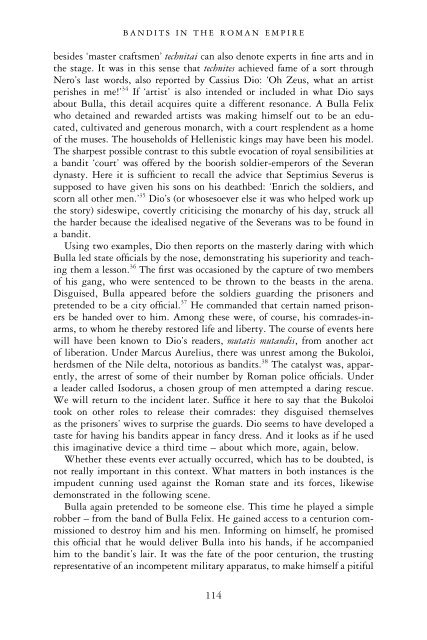You also want an ePaper? Increase the reach of your titles
YUMPU automatically turns print PDFs into web optimized ePapers that Google loves.
BANDITS IN THE ROMAN EMPIRE<br />
besides ‘master craftsmen’ technitai can also denote experts in fine arts and in<br />
the stage. It was in this sense that technites achieved fame of a sort through<br />
Nero’s last words, also reported by Cassius Dio: ‘Oh Zeus, what an artist<br />
perishes in me!’ 34 If ‘artist’ is also intended or included in what Dio says<br />
about Bulla, this detail acquires quite a different resonance. A Bulla Felix<br />
who detained and rewarded artists was making himself out to be an educated,<br />
cultivated and generous monarch, with a court resplendent as a home<br />
of the muses. The households of Hellenistic kings may have been his model.<br />
The sharpest possible contrast to this subtle evocation of royal sensibilities at<br />
a bandit ‘court’ was offered by the boorish soldier-emperors of the Severan<br />
dynasty. Here it is sufficient to recall the advice that Septimius Severus is<br />
supposed to have given his sons on his deathbed: ‘Enrich the soldiers, and<br />
scorn all other men.’ 35 Dio’s (or whosesoever else it was who helped work up<br />
the story) sideswipe, covertly criticising the monarchy of his day, struck all<br />
the harder because the idealised negative of the Severans was to be found in<br />
a bandit.<br />
Using two examples, Dio then reports on the masterly daring with which<br />
Bulla led state officials by the nose, demonstrating his superiority and teaching<br />
them a lesson. 36 The first was occasioned by the capture of two members<br />
of his gang, who were sentenced to be thrown to the beasts in the arena.<br />
Disguised, Bulla appeared before the soldiers guarding the prisoners and<br />
pretended to be a city official. 37 He commanded that certain named prisoners<br />
be handed over to him. Among these were, of course, his comrades-inarms,<br />
to whom he thereby restored life and liberty. The course of events here<br />
will have been known to Dio’s readers, mutatis mutandis, from another act<br />
of liberation. Under Marcus Aurelius, there was unrest among the Bukoloi,<br />
herdsmen of the Nile delta, notorious as bandits. 38 The catalyst was, apparently,<br />
the arrest of some of their number by Roman police officials. Under<br />
a leader called Isodorus, a chosen group of men attempted a daring rescue.<br />
We will return to the incident later. Suffice it here to say that the Bukoloi<br />
took on other roles to release their comrades: they disguised themselves<br />
as the prisoners’ wives to surprise the guards. Dio seems to have developed a<br />
taste for having his bandits appear in fancy dress. And it looks as if he used<br />
this imaginative device a third time – about which more, again, below.<br />
Whether these events ever actually occurred, which has to be doubted, is<br />
not really important in this context. What matters in both instances is the<br />
impudent cunning used against the Roman state and its forces, likewise<br />
demonstrated in the following scene.<br />
Bulla again pretended to be someone else. This time he played a simple<br />
robber – from the band of Bulla Felix. He gained access to a centurion commissioned<br />
to destroy him and his men. Informing on himself, he promised<br />
this official that he would deliver Bulla into his hands, if he accompanied<br />
him to the bandit’s lair. It was the fate of the poor centurion, the trusting<br />
representative of an incompetent military apparatus, to make himself a pitiful<br />
114


